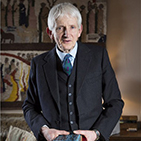
Mr. Gwynne offers the following facts: –
Teaching Experience
I doubt if the experience of anyone else teaching today is more wide-ranging than mine happens to be.
I shall summarise my experience, and if anyone knows of someone with more of it we can ask him or her to join us!
As to my background as a teacher, I am actually the only person I know (other than my daughter, and the tutors we have trained) who now teaches in the strictly traditional way that was almost universal until it was abolished in or around the 1960s; and I am able to contrast that because I have also had the experience of seeing the results of a very great deal of modern teaching in action.
As to my actual experience: –
I happen to have taught just about every academic subject: specifically, English grammar and English composition, Latin, Greek, French, German, arithmetic, algebra, geometry, history, geography, religion, philosophy in general and logic in particular, and even music.
I have lectured on medicine to practising nurses and even the occasional doctor, and have run courses for businessmen and businesswomen on “How to start up and run your own business”.
My pupils have numbered many hundreds of people, of many different nationalities, of all ages from two years old to over seventy years old, in half a dozen different countries. The teaching has taken place in many different settings: individually and in small groups, in private homes, in classrooms and in lecture halls, and, most of all, as of about ten years ago, “face-to-face” over the Internet (using Skype).
I have also taught and trained teachers how to teach.
If any other teachers today have a wider-ranging experience than this, I should like to be introduced to them!
Principal activities prior to teaching:-
1954-64. Educated at Eton College and Oxford University (graduated B.A., and in 1971 M.A.).
1966. Qualified as a Chartered Accountant (A.C.A. and F.C.A.).
1966-70. Held various executive positions in England, and executive positions and directorships in Australia, in the Slater Walker group, a London-based merchant bank and international conglomerate. ‘There have been success stories in the City before and will be again, but never has there been anything quite so big, so successful, and so singular as the growth of SWS…’ (London Financial Times), records the author David Kynaston on page 473, volume 4, of his classic historical work, The City of London (Chatto & Windus, 2001). The period, 1945-2000, covered by that volume, devotes as much space to Slater Walker as to any other institutions. Indeed, as confirmed in that quotation, Slater Walker was the most important UK-based “take-over bid” specialist that had ever existed up to that time. After nearly two years in England, N.M.G. was sent out to Australia, where he ended up number two in Slater Walker’s Australian subsidiary. During his time with the group in England and Australia, (a) he was involved in, and in Australia was responsible for, the administration of a large number of company acquisitions, both agreed and disputed, and (b) he was involved in reorganizations of a large number of companies after they had been acquired.
1971-84. Founder, Chairman and Chief Executive (CEO) of a multi-million dollar international business empire, Cork Investments Ltd., quoted on the Australian and London Stock Exchanges. Cork Investments Ltd. was subsequently renamed Camden Park Ltd., after the group’s most important asset, the famous Camden Park estate, Australia’s first and most historic pastoral property, whose founder, John Macarthur, was featured on the Australian $2 note until the $2 note was abolished a few years ago. The Camden Park estate operated the largest dairy farm in the southern hemisphere (more than 6,000 cows), in addition to being engaged in various mining activities. Other activities of Cork Investments Ltd. included property investment and development, finance, and stock exchange and commodity trading.